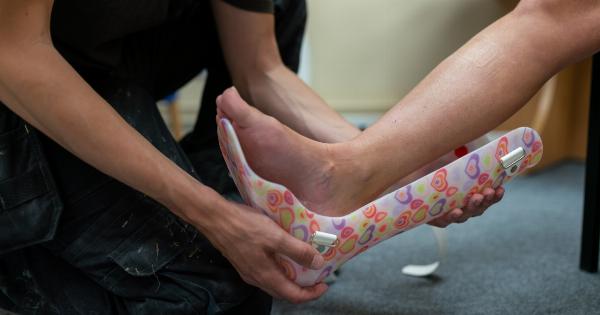Weight is an essential aspect of our overall health and well-being. Carrying excess weight can put strain on various parts of the body, particularly the feet. Foot pain is a common complaint among individuals who are overweight or obese.
In this article, we will explore the connection between weight and foot pain, the potential causes, and some practical tips to alleviate and prevent foot pain related to weight.
1. Understanding the Impact of Weight on Feet
The human foot is a complex structure composed of bones, muscles, ligaments, and tendons that work together to support the body’s weight and facilitate movement. When you carry excess weight, the feet bear the brunt of the pressure and strain.
With each step, the feet must support the weight of the entire body, making them vulnerable to various foot conditions and pain.
2. Common Foot Problems Associated with Weight
Excess weight increases the risk of developing various foot problems. Some of the most common foot conditions associated with weight include:.
2.1 Plantar Fasciitis
Plantar fasciitis is a condition characterized by inflammation of the plantar fascia, a thick band of tissue that runs across the bottom of the foot.
Excess weight puts additional stress on the plantar fascia, leading to pain, stiffness, and discomfort in the heel and arch of the foot.
2.2 Osteoarthritis
Osteoarthritis is a degenerative joint disease that commonly affects weight-bearing joints, including the knees and feet.
The extra weight can accelerate the wear and tear of the joint cartilage, leading to pain, swelling, and limited mobility in the feet.
2.3 Flat Feet
Flat feet, also known as fallen arches, occur when the arches of the feet collapse, causing the entire sole of the foot to come into complete or near-complete contact with the ground.
Obesity can contribute to the development of flat feet, as the excess weight puts excessive strain on the foot arches.
2.4 Metatarsalgia
Metatarsalgia is a condition that causes pain and inflammation in the ball of the foot. Excess weight can increase pressure on the metatarsal bones, leading to sharp or burning pain in the front of the foot.
2.5 Corns and Calluses
Corns and calluses are thickened, hardened areas of skin that develop due to excessive pressure or friction.
Overweight individuals are more susceptible to developing corns and calluses on the soles of their feet, as increased weight places greater pressure on specific areas.
3. Factors Contributing to Foot Pain
Along with excess weight, several other factors contribute to foot pain:.
3.1 Lack of Physical Activity
Obesity is often accompanied by a sedentary lifestyle, which can weaken the muscles and ligaments in the feet.
Inactivity also leads to decreased circulation, reducing the delivery of essential nutrients to the feet, further increasing the risk of foot pain.
3.2 Improper Footwear
Wearing ill-fitting shoes or shoes without proper arch support can exacerbate foot pain. This is particularly true for those carrying extra weight, as the feet are already under increased stress.
3.3 Overpronation
Overpronation occurs when the foot rolls excessively inward while walking or running. This abnormal foot movement can lead to various foot problems and pain, especially when combined with excessive weight.
4. Alleviating Foot Pain
Fortunately, there are steps individuals can take to alleviate and prevent foot pain related to weight:.
4.1 Weight Management
Losing weight can significantly reduce the strain on the feet. By maintaining a healthy weight, individuals can alleviate pressure on the feet, decrease the risk of foot conditions, and improve overall mobility.
4.2 Regular Exercise
Engaging in low-impact exercises like swimming, cycling, or walking can help strengthen the muscles, ligaments, and tendons of the feet. Increased physical activity also aids in weight management and overall foot health.
4.3 Proper Footwear
Investing in well-fitted shoes with good arch support can provide better foot stability and reduce the risk of foot pain. Avoiding high heels and opting for shoes that allow for proper foot movement can also alleviate strain on the feet.
4.4 Orthotic Inserts
In some cases, orthotic inserts or shoe insoles may be recommended to provide additional support and alleviate foot pain. These inserts can help distribute weight evenly and relieve strain on specific areas of the foot.
4.5 Foot Stretches and Exercises
Performing regular foot stretches and exercises can help improve foot flexibility, strength, and stability. Consult with a healthcare professional or physical therapist for specific exercises tailored to your needs.
5. When to Seek Professional Help
If foot pain persists or worsens despite self-care measures, it is important to seek professional help. A podiatrist or foot specialist can accurately diagnose the underlying cause of the foot pain and recommend appropriate treatment options.
Conclusion
The connection between weight and foot pain is evident, with excess weight placing significant strain on the feet.
However, by managing weight, engaging in regular exercise, wearing proper footwear, and practicing good foot care, individuals can alleviate foot pain and improve their overall foot health. Seeking professional help is advised for persistent or worsening foot pain.































